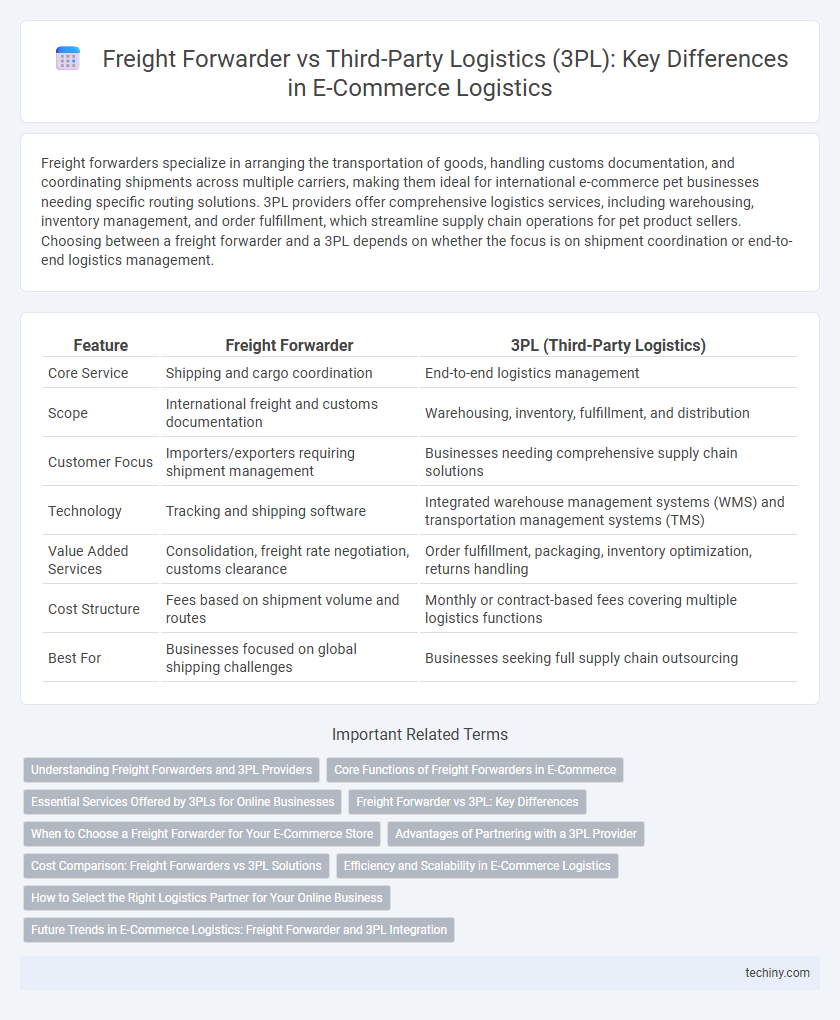Freight forwarders specialize in arranging the transportation of goods, handling customs documentation, and coordinating shipments across multiple carriers, making them ideal for international e-commerce pet businesses needing specific routing solutions. 3PL providers offer comprehensive logistics services, including warehousing, inventory management, and order fulfillment, which streamline supply chain operations for pet product sellers. Choosing between a freight forwarder and a 3PL depends on whether the focus is on shipment coordination or end-to-end logistics management.
Table of Comparison
| Feature | Freight Forwarder | 3PL (Third-Party Logistics) |
|---|---|---|
| Core Service | Shipping and cargo coordination | End-to-end logistics management |
| Scope | International freight and customs documentation | Warehousing, inventory, fulfillment, and distribution |
| Customer Focus | Importers/exporters requiring shipment management | Businesses needing comprehensive supply chain solutions |
| Technology | Tracking and shipping software | Integrated warehouse management systems (WMS) and transportation management systems (TMS) |
| Value Added Services | Consolidation, freight rate negotiation, customs clearance | Order fulfillment, packaging, inventory optimization, returns handling |
| Cost Structure | Fees based on shipment volume and routes | Monthly or contract-based fees covering multiple logistics functions |
| Best For | Businesses focused on global shipping challenges | Businesses seeking full supply chain outsourcing |
Understanding Freight Forwarders and 3PL Providers
Freight forwarders specialize in organizing shipments for individuals or businesses, handling tasks like booking cargo space, negotiating freight rates, and managing customs documentation for smooth international transport. Third-Party Logistics (3PL) providers offer comprehensive supply chain solutions, including warehousing, inventory management, order fulfillment, and last-mile delivery services, beyond mere transportation coordination. Understanding the distinct roles of freight forwarders and 3PL providers helps e-commerce businesses optimize logistics efficiency and streamline global shipping operations.
Core Functions of Freight Forwarders in E-Commerce
Freight forwarders in e-commerce specialize in managing the transportation of goods by coordinating shipments, booking cargo space, and handling customs documentation to ensure smooth cross-border delivery. They act as intermediaries between shippers and carriers, optimizing route planning and freight consolidation to reduce shipping costs and transit times. Unlike 3PL providers, freight forwarders primarily focus on international freight movement rather than warehousing or last-mile fulfillment services.
Essential Services Offered by 3PLs for Online Businesses
3PLs provide comprehensive logistics solutions including warehousing, inventory management, order fulfillment, and last-mile delivery, tailored specifically for e-commerce businesses. They integrate technology platforms for real-time tracking and seamless supply chain management, enhancing customer experience and operational efficiency. Freight forwarders primarily focus on international shipping and customs clearance, whereas 3PLs offer end-to-end logistics support critical for online retailers' growth.
Freight Forwarder vs 3PL: Key Differences
Freight forwarders primarily manage the shipment process by coordinating transportation, customs clearance, and documentation, focusing on moving goods from origin to destination efficiently. Third-Party Logistics (3PL) providers offer comprehensive supply chain solutions, including warehousing, inventory management, order fulfillment, and transportation services. The key difference lies in scope: freight forwarders specialize in shipment coordination, while 3PLs deliver end-to-end logistics management that integrates multiple supply chain functions.
When to Choose a Freight Forwarder for Your E-Commerce Store
Choosing a freight forwarder for your e-commerce store is ideal when managing international shipping complexities such as customs clearance, multi-modal transportation, and consolidating shipments to reduce costs. Freight forwarders specialize in navigating global trade regulations and coordinating carrier services, making them essential for scaling cross-border operations efficiently. E-commerce businesses focusing on large volume shipments or seeking expertise in documentation and compliance benefit significantly from partnering with freight forwarders over traditional 3PL providers.
Advantages of Partnering with a 3PL Provider
Partnering with a 3PL provider enhances supply chain efficiency by integrating freight forwarding, warehousing, and inventory management services. 3PLs offer scalable solutions tailored to e-commerce businesses, improving last-mile delivery speed and customer satisfaction. Leveraging advanced technology platforms, 3PL providers optimize order fulfillment and reduce operational costs, driving stronger competitive advantage in the e-commerce market.
Cost Comparison: Freight Forwarders vs 3PL Solutions
Freight forwarders typically offer lower upfront costs by specializing in transportation booking and documentation, making them ideal for businesses focused solely on shipping. In contrast, 3PL solutions encompass a broader range of services, including warehousing, inventory management, and order fulfillment, which can increase overall expenses but provide comprehensive supply chain management. Evaluating the cost-effectiveness depends on the scale of operations and the need for integrated logistics services versus standalone freight management.
Efficiency and Scalability in E-Commerce Logistics
Freight forwarders specialize in coordinating international shipments and customs clearance, offering streamlined processes that enhance efficiency in global e-commerce supply chains. Third-Party Logistics providers (3PLs) deliver comprehensive services including warehousing, order fulfillment, and last-mile delivery, enabling scalable logistics solutions tailored to fluctuating e-commerce demand. Leveraging 3PLs supports dynamic inventory management and flexible distribution networks, crucial for scaling e-commerce operations and improving overall operational efficiency.
How to Select the Right Logistics Partner for Your Online Business
Choosing the right logistics partner for your online business depends on your specific shipping needs, volume, and budget. Freight forwarders specialize in managing international shipping routes, customs documentation, and freight consolidation, making them ideal for businesses with complex global supply chains. Third-Party Logistics (3PL) providers offer comprehensive services including warehousing, order fulfillment, and last-mile delivery, better suited for e-commerce companies focused on scalable domestic and international logistics solutions.
Future Trends in E-Commerce Logistics: Freight Forwarder and 3PL Integration
Future trends in e-commerce logistics emphasize the seamless integration of freight forwarders and 3PL providers to enhance supply chain efficiency and reduce delivery times. Advanced technologies like AI-driven route optimization, real-time tracking, and blockchain transparency are driving collaborative platforms that unify freight forwarding and warehousing services. This convergence supports scalable, flexible logistics solutions tailored to increasing direct-to-consumer demands and global market expansion.
Freight Forwarder vs 3PL (Third-Party Logistics) Infographic

 techiny.com
techiny.com